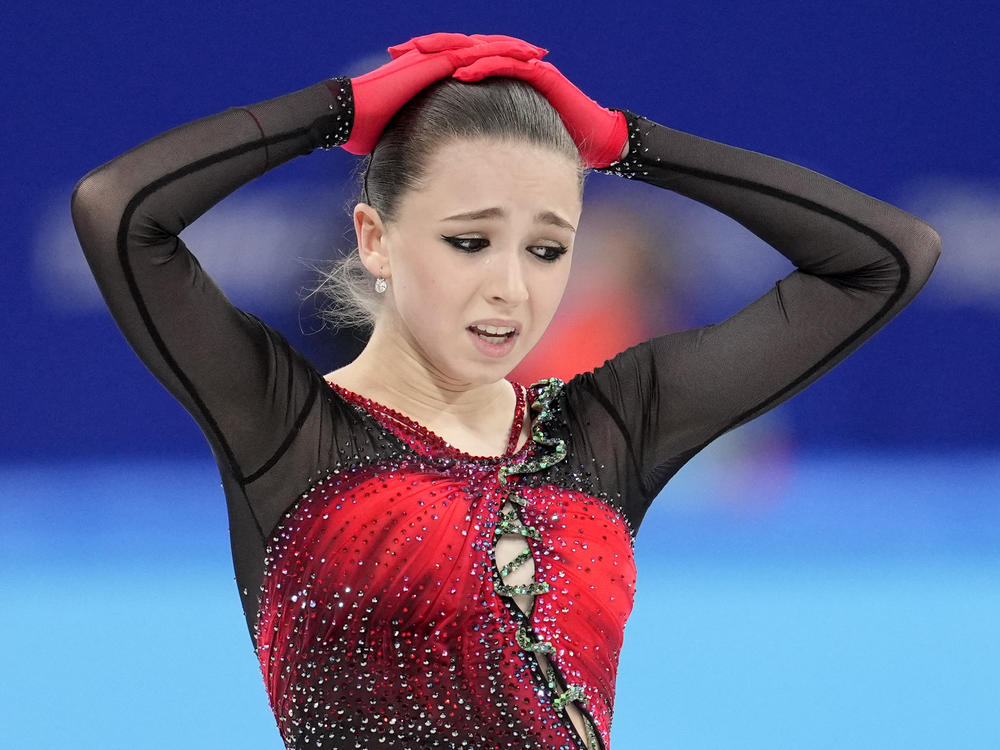Section Branding
Header Content
Kamila Valieva doping scandal that rocked the Beijing Olympics may finally be settled
Primary Content
An international sports tribunal known as the Court of Arbitration for Sport begins a hearing today in Lausanne, Switzerland, that's expected to finally settle a doping scandal that shook the 2022 Winter Olympics in Beijing.
The crisis in the figure skating world actually began a few weeks before the Beijing Games opened. Kamila Valieva — then a 15-year-old superstar — competed at a national event in St. Petersburg, Russia, in December 2021.
She skated masterfully, but a sample taken during the competition later tested positive for a banned performance-enhancing heart medication. Many experts and international sports officials believe that should have disqualified Valieva from the Olympics.
But the result was only revealed after she competed in Beijing, helping Russia win a team gold medal. Then — right before the award ceremony — chaos erupted.
"We were dressed in our ceremony gear, in a room waiting to to take a bus to the venue and we were told, this is canceled," recalled Zach Donohue, a member of the U.S. figure skating team, in an interview with NPR earlier this year.
It appeared Valieva's test result would turn a U.S. silver medal win into gold, elevating Japan to the silver medal slot and bumping the Canadian figure skating team up to a bronze finish.
Athletes were promised a swift resolution, but as the months dragged on disappointment turned to "outrage and just disbelief," Donohue said.
"We're now closing in on 600 days" since the competition, said U.S. figure skater Vincent Zhou, in an interview Monday with NPR. "We haven't heard anything, we haven't been communicated with and we're really in the dark here."
A hearing behind closed doors draws fresh attention to Russia's doping culture
Donohue, Zhou and their teammates petitioned to be present at this week's hearing in Switzerland, but they were denied.
In a statement, the international Court of Arbitration for Sport said it will hear at least three days of testimony behind closed doors before ruling on Valieva's fate — she could face disqualification for up to four years — and settling who gets what medals.
According to Zhou, as this scandal has dragged on without resolution, the harm to him, his fellow athletes and their sport has already been done.
"This certainly is a statement about the state of clean sport and a landmark in the history of doping scandals in the Olympics and in figure skating," he said.
This week's hearing also draws fresh attention to the long shadow of systemic doping that has hung over Russian sports programs for years.
Officials from the Russian Anti-Doping Agency will be present and Valieva herself is expected to attend via video conference.
Speaking to NPR last year, Travis Tygart, head of the U.S. Anti-Doping Agency, said the case revealed Russia's athletic culture is still rotten.
"Them abusing young athletes is really unacceptable," Tygart said then. "When is the world going to step up and say we're not going to allow that to happen on our watch?"
The International Olympic Committee is expected to allow Russian athletes to participate at the Paris Games next summer on the same terms as in Beijing.
They won't be allowed to compete under the Russian flag or play the Russian national anthem.
Skater Vincent Zhou described those punishments as a slap on the wrist.
"Obviously there's still doping going on as the Valieva case shows. It's just business as usual and there's no real repercussion," he said.
It's unclear when the Court of Arbitration for Sport will issue its ruling in the Valieva case, finally clearing the way for the last medal ceremony of the 2022 Beijing Winter Olympics.
Copyright 2023 NPR. To see more, visit https://www.npr.org.


